Getting back to basics: Kona Historical Society resumes Portuguese bread baking program
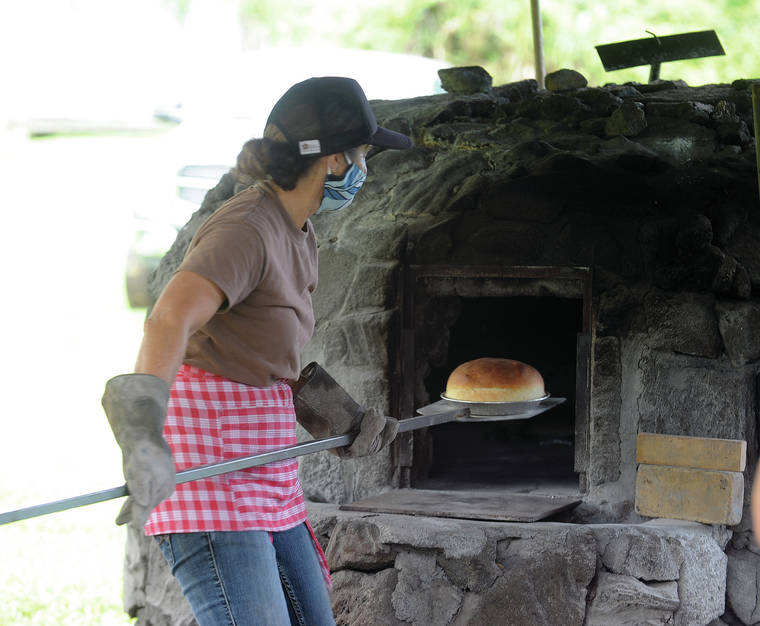
Kuulani Auld removes a loaf of bread from the Portugese stone oven Thursday at the Kona Historical Society. (Laura Ruminski/West Hawaii Today)
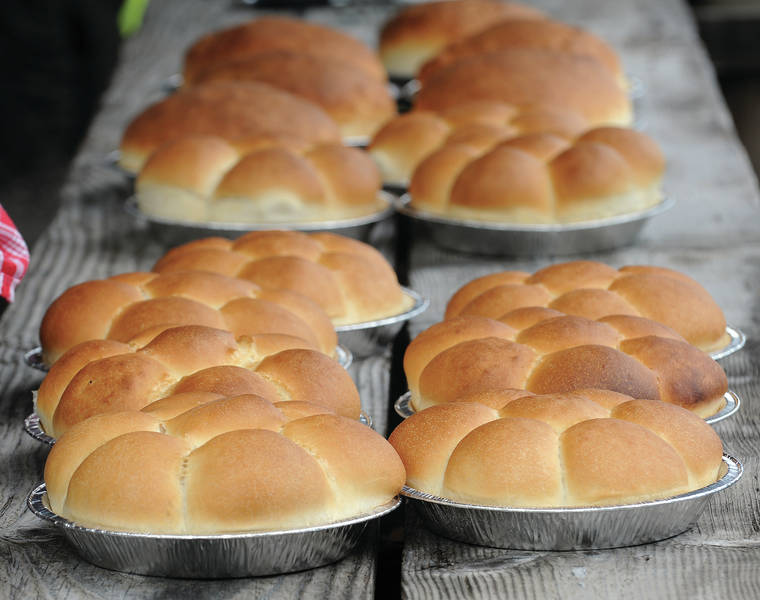
Bread fresh from the Portugese stone oven at Kona Historical Society cools on Thursday. (Laura Ruminski/West Hawaii Today)
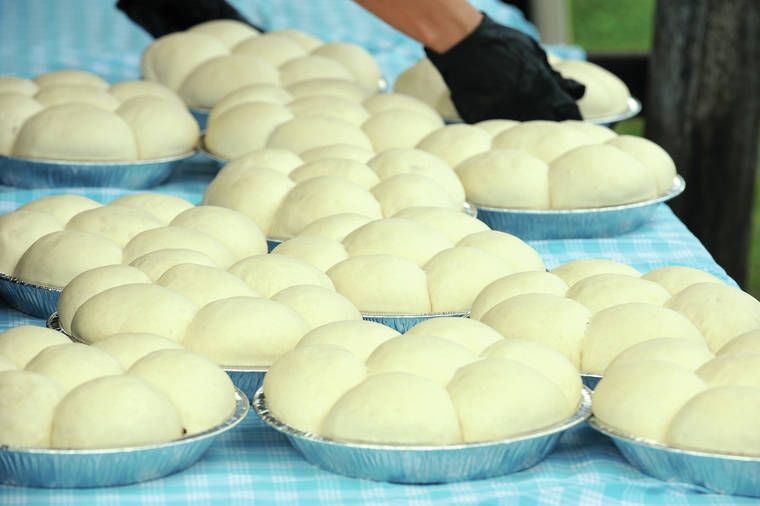
Bread is ready to be baked in the Portugese stone oven Thursday at the Kona Historical Society. (Laura Ruminski/West Hawaii Today)
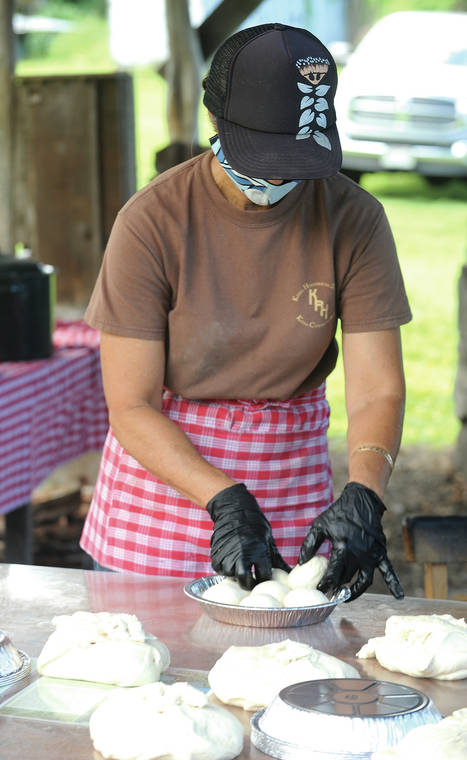
Kuulani Auld fills pans with bread dough to be baked in the Portugese stone oven Thursday at the Kona Historical Society. (Photos by Laura Ruminski/West Hawaii Today)
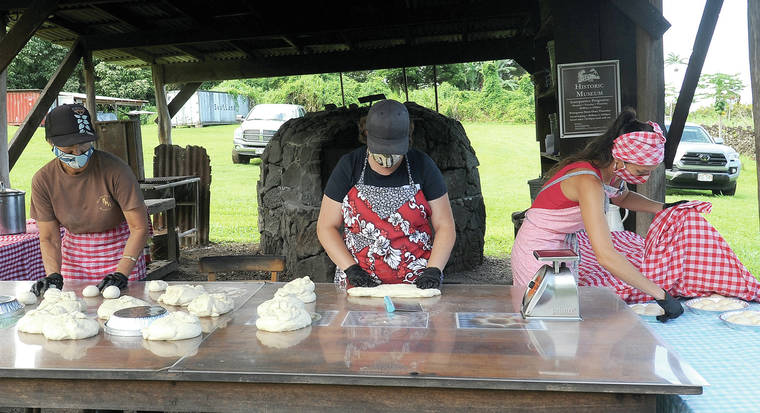
Kuulani Auld, left, Audrey Blair and Alexis Ching prepare bread for the Portugese stone oven Thursday at the Kona Historical Society. (Laura Ruminski/West Hawaii Today)
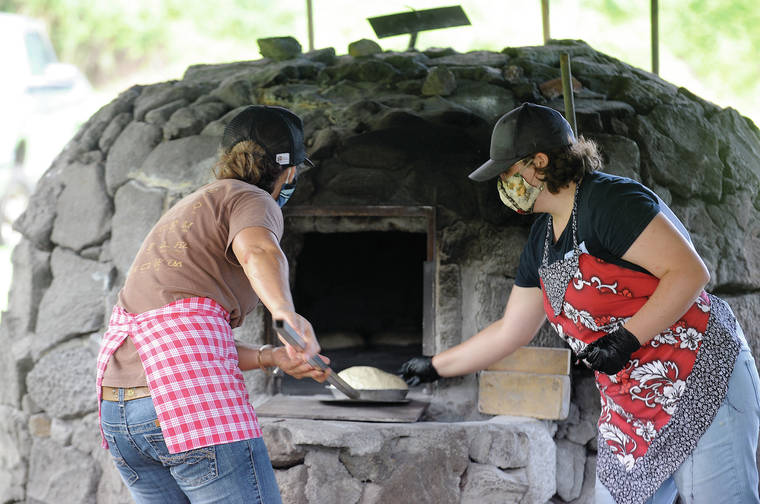
Kuulani Auld, left and Audrey Blair fill the Portugese stone oven with bread Thursday at the Kona Historical Society.
The fire was stoked early Thursday morning as members of the Kona Historical Society resumed bread baking in their Portuguese stone oven.
The fire was stoked early Thursday morning as members of the Kona Historical Society resumed bread baking in their Portuguese stone oven.
Society members said they were excited to welcome back the public to this popular program, which was suspended after the March 12 bake. Modifications and the implementation of numerous safety measures have been put in place, including an emphasis on cleaning, physical distancing practices and the mandatory use of face masks or cloth coverings.
“One of the most important ways we tell Kona’s history at Kona Historical Society is through making it come alive, literally! Getting the oven fired up again and baking the bread that has fed our community for 140 years is a truly exciting first step to reopening our sites,” said Audrey Blair, Kona Historical Society’s public programs manager.
The public is invited every Thursday to learn about the traditional art of Portuguese bread making, as well as the contributions of the Portuguese, who arrived in Hawaii in the 1880s and are credited with helping develop Kona’s dairy industry. There will be no public participation in the actual rolling or baking of bread.
The oven, or forno, was built in 2006 after extensive research, visiting homestead sites that had backyard ovens and gleaning knowledge from oral history. The oven, made from lava rock, was modeled after one found in Kona. The walls are at least 10 inches thick and when the fire is started with kiawe wood, temperatures reach over 700 degrees. Once the temperature cools down to 500 degrees, the wood and ash is removed and up to 32 pans of bread are arranged inside.
Program Director Kuulani Auld said ovens from different areas of the island were made from different materials and used different wood, depending on what was readily available for that region.
“In Honokaa, the ovens were made from river rock,” said Auld.
The perfectly baked pans of white and sweet bread Kona residents have enjoyed for the last 14 years is a result of trial and error.
“In the beginning, the first couple of batches we made, we fed the cows a lot,” recalled Auld.
From 10 a.m. to noon every Thursday in a designated observation area, the public may watch the baking action at the stone oven located in the Kalukalu Pasture, just below the society’s headquarters and historic general store museum in Kealakekua. There they will discover the importance and operation of stone ovens.
“This is ideal sensory learning,” said Blair. “We have had people come down to watch and were inspired to build their own oven.”
The group of three women, including programs coordinator Alexis Ching, start their day at 6 a.m. when they start the fire. Next they make the bread dough in the society’s certified kitchen.
Once the dough has risen and the coals swept from the oven, the women commence with a well orchestrated routine of cutting and measuring the dough, rolling the sections and placing them in the round tins and brushing with egg wash, all while talking story and providing history to patrons.
Batches of bread remain in the over for approximately 20 minutes emitting an intoxicating aroma.
Following the end of each bake, Kona Historical Society sells approximately 80 loaves of sweet and white bread under the tent fronting the white building near the society’s headquarters. Because it is currently a drive-through market, customers must stay in their vehicles, drive to the tent following the directional signs, and wear a mask when purchasing bread. Each loaf of bread costs $8. All sales via cash or credit card are on a first-come, first-served basis.
Bread sales begin around 2 p.m. and last until 5 p.m. or everything is sold out. Leftover bread will be donated the following day to organizations in Kona that are currently helping feed the hungry.
Along with each bag of bread, customers will receive a flyer featuring a historic story from a community member. For example, Kona paniolo Frank Silva shares how his father would make more money selling his mother’s homemade Portuguese bread than pounding rocks in the 1940s.
For more information, visit www.konahistorical.org. To view the latest happenings or to participate in a digital program, go to www.facebook.com/konahistoricalsociety.


